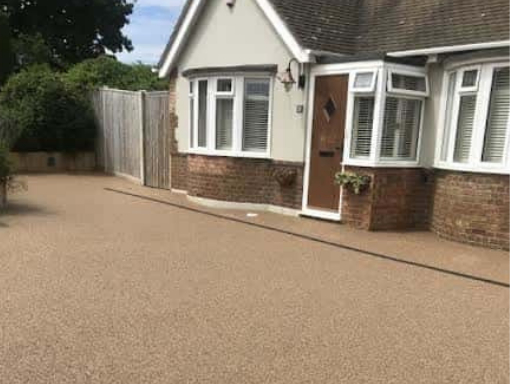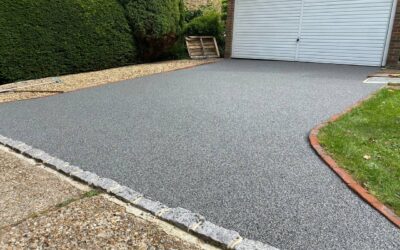Driveways frequently use concrete or Resin as their favorite materials, and for a good reason. Concrete slabs are highly sturdy, long-lasting, and low maintenance. Concrete is a comparatively cost-effective material for paving huge areas due to its strength and durability combined. Concrete is more expensive than asphalt and gravel for driveway surfaces. Still, it is significantly less costly than brick, Resin Bound or cobblestone—and concrete driveways often outlast all of these. Concrete can be coloured and stamped to create a distinctive and attractive surface, even though plain concrete can have a dull appearance.
Concrete as a Material in Building
Although cement is occasionally used interchangeably with concrete in groundwork jobs, cement refers to just one of the materials that go into making concrete. Concrete is a composite material formed of different kinds of stone aggregate that is joined together by a solution of water and a binder made of lime. The cement is a combination of limestone and finely ground clay powder.
Depending on the concrete’s intended use, the aggregate size in the mixture can change. Structures use concrete with gravel-sized aggregates. However, you can also use finer sands as the aggregate for finer work and more excellent finished surfaces. The mix used in concrete driveways and paths and other paving surfaces typically uses a mixture of aggregate consisting of gravel to sand-sized particles.
Concrete may be poured and molded into any shape it needs to be when mixed. The concrete then gradually becomes more solid as it cures. Even though it takes several months or even years for the material to harden, most full uses only require a few days of curing. Steel metal reinforcement wire, often known as rebar, is frequently used to reinforce concrete inside the slab. Additional components, such as agents that increase strength or slow drying, might be added during the mixing process.
Concrete Driveways Installation Process
Although it is technically possible for a homeowner to install their concrete driveway independently, it is very labor-intensive. Given how quickly concrete starts to harden after pouring, time is crucial. Please leave it to expert driveway contractors who can promptly excavate, create forms, pour concrete, and finish the surface.
A homeowner typically needs a week or more for only excavation and preparation, then another extremely long day for pouring and finishing. However, a professional crew may complete the project in a few days. Having a team of willing and capable specialists to do groundwork services like this is recommended for homeowners.
The following are the steps for installing a concrete driveway:
Step 1
An expert will visit your home and provide you with a detailed quote and project plan. The concrete will survive longer on stable, level, and well-drained soil. Your driveway contractor will let you know if additional work is needed to prepare your property for the sub-base.
Step 2
Before the team starts the groundwork, they must ensure that the machinery is all set.
Step 3
The crew will inspect the gravel base.
Step 4
The team will then construct forms in the shape that the concrete will take before pouring it.
Step 5
The concrete will set pretty quickly, and your pavement is still smoothed. The driveway experts will use power and hand equipment to level and smooth the surface.
Step 6
After installing the concrete, team members will apply a curing chemical to the surface. The curing chemical reduces the rate of water loss over 30 days, resulting in more robust, more attractive concrete.
Step 7
Before you can utilize your new concrete driveway, it needs to cure for 7–10 days. Concrete hardens quite rapidly, but it doesn’t become firm until it is. Therefore, it’s crucial to prevent cars, animals, and people from using the surface for several hours. Any unauthorized surface use can leave behind persistent stains.
Step 8
Workers will now remove the forms and tidy up after the initial set.
How to Maintain Your Concrete Driveway
Many people assume that concrete driveways require almost little maintenance. However, it does pay to keep the pavement clean and sealed if you want to maximize its longevity. Cleaning is often accomplished with a thorough scrub with a hose and sharp brush, and concrete sealant will provide an additional layer of protection. At the very least once a year, you should apply a sealer. The optimum time to seal a driveway if you live in a snowy area is in the fall to ensure the slab will withstand road salts and severe winter weather.
Concrete Driveway Contractors Near Me
Please trust the professionals when planning to install a concrete driveway for your home. We at Oldham Resin Driveways encourage open communication with our clients and make every effort to keep you updated before, during, and after project completion. Don’t hesitate to contact us if you have any enquiries about concrete driveways. Call us for a free quote. We are your local driveway contractors for all your paving needs and have years of driveway experience to back us up.



